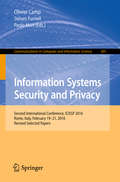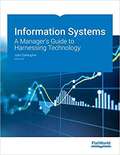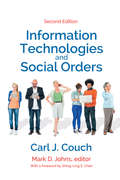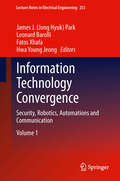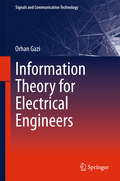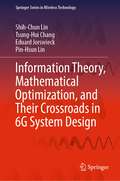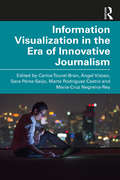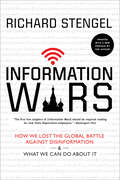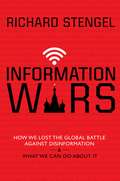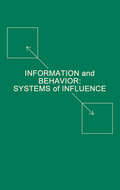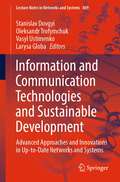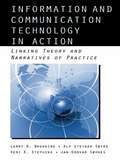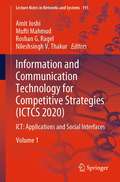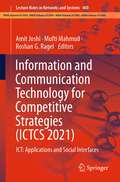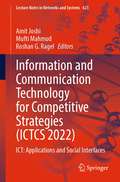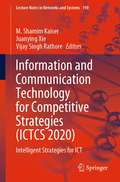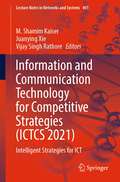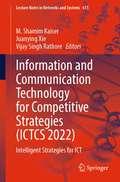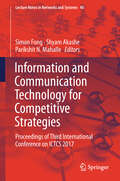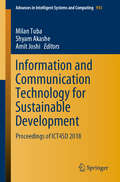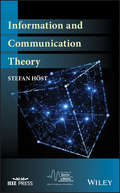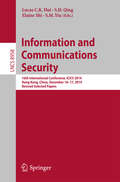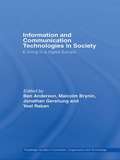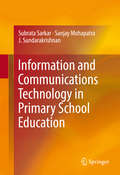- Table View
- List View
Information Systems Security and Privacy
by Steven Furnell Olivier Camp Paolo MoriSlamming the door on security threats just got easier for IT professionals. This resource on security design and operations puts tools and techniques at their command, providing the expertise on things from access control to privacy enhancement.
Information Systems: A Manager's Guide to Harnessing Technology Version 8.0
by John GallaugherKey Features: *Unique approach to information systems by leading with strategic thinking before diving into technical topics *Current and engaging case studies that challenge students to apply what they’ve learned *Coverage of not only strategy and technology basics, but also of critical concepts including data analytics, security, social media, the sharing economy, disruptive innovation, network effects and more *In-depth profiles on widely known firms such as Facebook, Amazon, Google, Netflix, Rent the Runway, and Zara.
Information Technologies and Social Orders (Communication And Social Order Ser.)
by Carl J. CouchAccording to Carl J. Couch, the history of human society is one of successive, sometimes overlapping, information technologies used to process the various symbolic representations that inform social contexts. Unlike earlier “media” theorists who ignored social context in order to concentrate on the information technologies themselves, Couch implements a consistent theory of interpersonal and intergroup relations to describe the essential interface between information technologies and the social contexts in which they are used. Couch emphasizes the formative capacities of information technologies across historical epochs and cultures, and places them within the major institutional relations of various societies. He views social orders as reflexively shaped by the information technologies that participants use, and as susceptible to mass brutality and oppression due to oligarchic control though he hopes technology will remain humane. The original edition of this manuscript was nearly complete at the time of Couch’s death and was brought to completion by two of his closest associates. Now after two decades, during which its impact is indisputable, it has been updated for a new generation of students and scholars. Additions include discussions on books in the digital age, social media, mobile telephones, recordings, participatory culture, and more.
Information Technology Convergence: Security, Robotics, Automations and Communication
by Fatos Xhafa James J. Park Hwa Young Jeong Leonard BarolliInformation technology and its convergence issue is emerging rapidly as an exciting new paradigm with user-centric environment to provide computing and communication services. This area will be the most comprehensive topics with various aspects of advances in information technology and its convergence services. This book covers all topics as computational science and applications, electronics engineering, manufacturing technology, services, technical skill to control the robot, automatic operation and application, simulation and testing communication and many more.
Information Technology Convergence: Security, Robotics, Automations and Communication (Lecture Notes in Electrical Engineering #253)
by Fatos Xhafa James J. Jong Hyuk Park Hwa Young Jeong Leonard BarolliInformation technology and its convergence issue is emerging rapidly as an exciting new paradigm with user-centric environment to provide computing and communication services. This area will be the most comprehensive topics with various aspects of advances in information technology and its convergence services. This book covers all topics as computational science and applications, electronics engineering, manufacturing technology, services, technical skill to control the robot, automatic operation and application, simulation and testing communication and many more.
Information Theory for Electrical Engineers (Signals And Communication Technology)
by Orhan GaziThis book explains the fundamental concepts of information theory, so as to help students better understand modern communication technologies. It was especially written for electrical and communication engineers working on communication subjects. The book especially focuses on the understandability of the topics, and accordingly uses simple and detailed mathematics, together with a wealth of solved examples.The book consists of four chapters, the first of which explains the entropy and mutual information concept for discrete random variables. Chapter 2 introduces the concepts of entropy and mutual information for continuous random variables, along with the channel capacity. In turn, Chapter 3 is devoted to the typical sequences and data compression. One of Shannon’s most important discoveries is the channel coding theorem, and it is critical for electrical and communication engineers to fully comprehend the theorem. As such, Chapter 4 solely focuses on it.To gain the most from the book, readers should have a fundamental grasp of probability and random variables; otherwise, they will find it nearly impossible to understand the topics discussed.
Information Theory, Mathematical Optimization, and Their Crossroads in 6G System Design (Springer Series in Wireless Technology)
by Shih-Chun Lin Tsung-Hui Chang Eduard Jorswieck Pin-Hsun LinThis book provides a broad understanding of the fundamental tools and methods from information theory and mathematical programming, as well as specific applications in 6G and beyond system designs. The contents focus on not only both theories but also their intersection in 6G. Motivations are from the multitude of new developments which will arise once 6G systems integrate new communication networks with AIoT (Artificial Intelligence plus Internet of Things). Design issues such as the intermittent connectivity, low latency, federated learning, IoT security, etc., are covered. This monograph provides a thorough picture of new results from information and optimization theories, as well as how their dialogues work to solve aforementioned 6G design issues.
Information Visualization in The Era of Innovative Journalism
by Carlos Toural-BranInformation Visualization in the Era of Innovative Journalism brings together over 30 authors from countries around the world to synthesize how recent technological innovations have impacted the development, practice and consumption of contemporary journalism. As technology rapidly progresses, shifts, and innovates, there have been immense changes in the way we communicate. This book collects research from around the world that takes an in-depth look at the primary transformations related to journalistic innovation in recent times. High-profile contributors provide cutting-edge scholarship on innovation in journalism as it relates to emergent topics such as virtual reality, podcasting, multimedia infographics, social media, mobile storytelling and others. The book pays special attention to the development of information visualization and the ability of recent innovations to meet audience needs and desires. Students and scholars studying contemporary journalism history and practice will find this a vital and up-to-date resource, as well as those studying communication technology as it relates to marketing, PR or mass media broadly.
Information Wars: How We Lost the Global Battle Against Disinformation & What We Can Do About It
by Richard StengelA “well-told” insider account of the State Department’s twenty-first-century struggle to defend America against malicious propaganda and disinformation (The Washington Post).Disinformation is nothing new. When Satan told Eve nothing would happen if she bit the apple, that was disinformation. But today, social media has made disinformation even more pervasive and pernicious. In a disturbing turn of events, authoritarian governments are increasingly using it to create their own false narratives, and democracies are proving not to be very good at fighting it.During the final three years of the Obama administration, Richard Stengel, former editor of Time, was an Under Secretary of State on the front lines of this new global information war—tasked with unpacking, disproving, and combating both ISIS’s messaging and Russian disinformation. Then, during the 2016 election, Stengel watched as Donald Trump used disinformation himself. In fact, Stengel quickly came to see how all three had used the same playbook: ISIS sought to make Islam great again; Putin tried to make Russia great again; and we know the rest.In Information Wars, Stengel moves through Russia and Ukraine, Saudi Arabia and Iraq, and introduces characters from Putin to Hillary Clinton, John Kerry, and Mohamed bin Salman, to show how disinformation is impacting our global society. He illustrates how ISIS terrorized the world using social media, and how the Russians launched a tsunami of disinformation around the annexation of Crimea—a scheme that would became a model for future endeavors. An urgent book for our times, now with a new preface from the author, Information Wars challenges us to combat this ever-growing threat to democracy.“[A] refreshingly frank account . . . revealing.” —Kirkus Reviews“This sobering book is indeed needed to help individuals better understand how information can be massaged to produce any sort of message desired.” —Library Journal
Information Wars: How We Lost the Global Battle Against Disinformation and What We Can Do About It
by Richard StengelFrom former Time editor and Under Secretary of State Richard Stengel, this is the first and only insider account of how the U.S. tried--and failed--to combat the global rise of disinformation that eventually spilled into the 2016 election. In February of 2013, Richard Stengel, the former editor of Time, joined the Obama administration as Under Secretary of State for Public Diplomacy and Public Affairs. Within days, two shocking events made worldwide headlines: ISIS executed American journalist James Foley in a graphic video seen by millions, and Vladimir Putin's "little green men"--Russian special forces--invaded Crimea, accompanied by a blizzard of Russian denials and false flags. What these events had in common besides their violent lawlessness is that they were the opening salvos in a new era of global information warfare, in which countries and non-state actors use social media and disinformation to create their own narratives and undermine anyone who opposes them. Stengel was thrust onto the front lines of this battle as he was tasked with responding to the relentless weaponizing of information by ISIS, Russia, China, and others. He saw the scale of what he was up against and found himself hopelessly outgunned. Then, in 2016, the wars Stengel was fighting abroad came home during the presidential election, as "fake news" became a rallying cry and the Russians used the techniques they learned in Ukraine to influence the election here. Rarely has an accomplished journalist been not only a close observer but also a principal participant in American foreign policy as events unfold, issues are debated, and decisions are made. Stengel takes you behind the scenes in the ritualized world of diplomacy, from the daily 8:30 morning huddle with a restless John Kerry to a midnight sit-down in Saudi Arabia with the prince of darkness, Mohammed bin Salman. The result is a compulsively readable account of how this new kind of warfare works and how difficult it is to fight. RICHARD STENGEL was the Under Secretary of State for Public Diplomacy and Public Affairs from 2013 to 2016. Before working at the State Department, he was the editor of Time for seven years, from 2006 to 2013. From 1992 to 1994, he collaborated with Nelson Mandela on the South African leader's autobiography Long Walk to Freedom. Stengel later wrote Mandela's Way, a New York Times bestseller, on his experience working with Mandela. He is the author of several other books, including January Sun, a book about life in a small South African town, as well as You're Too Kind: A Brief History of Flattery. He is an NBC/MSNBC analyst and lives in New York.
Information and Behavior: Systems of Influence (Routledge Communication Series)
by Richard A. WinettFirst Published in 1986. Routledge is an imprint of Taylor & Francis, an informa company.
Information and Communication Technologies and Sustainable Development: Advanced Approaches and Innovations in Up-to-Date Networks and Systems (Lecture Notes in Networks and Systems #809)
by Larysa Globa Stanislav Dovgyi Oleksandr Trofymchuk Vasyl UstimenkoThe book highlights the most important research areas in ICT, their impact on e-society, environment sustainable development, namely analytics, security, geoinformation systems, and mathematical modeling. The studies contain a discussion on artificial intelligence in various spheres of society, practical implementation of the IoT, geoinformation systems, and remote sensing of the earth. The book focuses on improving services providing, system architecture for SDN, forecasting social and environment sustainable development based on global information space, a new approach to radio electronics systems for the novel cloud infrastructure implementation. The results are used for novel systems and to promote new approaches for e-societies. The book offers a valuable resource for specialists of R&D organizations, the management of state administration who are involved in sustainable society development, professors, university lecturers, Ph.D. students, and bachelor and master degree students.
Information and Communication Technologies in Action: Linking Theories and Narratives of Practice
by Larry D. Browning Alf Steinar Saetre Keri Stephens Jan-Oddvar SornesThis book combines 20 stories from a variety of organizations with a selection of nine theories, both mainstream and emerging. The stories introduce readers to individuals talking about how they communicate today via information and communication technologies (ICTs) in business or organizational contexts. The theories, presented in accessible language, illuminate the implicit patterns in these stories. This book demonstrates how and why these technologies are used under myriad circumstances.
Information and Communication Technology for Competitive Strategies: ICT: Applications and Social Interfaces (Lecture Notes in Networks and Systems #191)
by Amit Joshi Nileshsingh V. Thakur Mufti Mahmud Roshan G. RagelThis book contains the best selected research papers presented at ICTCS 2020: Fifth International Conference on Information and Communication Technology for Competitive Strategies. The conference was held at Jaipur, Rajasthan, India, during 11–12 December 2020. The book covers state-of-the-art as well as emerging topics pertaining to ICT and effective strategies for its implementation for engineering and managerial applications. This book contains papers mainly focused on ICT for computation, algorithms and data analytics, and IT security.
Information and Communication Technology for Competitive Strategies: ICT: Applications and Social Interfaces (Lecture Notes in Networks and Systems #400)
by Amit Joshi Mufti Mahmud Roshan G. RagelThis book contains best selected research papers presented at ICTCS 2021: Sixth International Conference on Information and Communication Technology for Competitive Strategies. The conference will be held at Jaipur, Rajasthan, India, during December 17–18, 2021. The book covers state-of-the-art as well as emerging topics pertaining to ICT and effective strategies for its implementation for engineering and managerial applications. This book contains papers mainly focused on ICT for computation, algorithms and data analytics, and IT security. The book is presented in two volumes.
Information and Communication Technology for Competitive Strategies: ICT: Applications and Social Interfaces (Lecture Notes in Networks and Systems #623)
by Amit Joshi Mufti Mahmud Roshan G. RagelThis book contains best selected research papers presented at ICTCS 2022: Seventh International Conference on Information and Communication Technology for Competitive Strategies. The conference will be held in Chandigarh, India during 9 – 10 December 2022. The book covers state-of-the-art as well as emerging topics pertaining to ICT and effective strategies for its implementation for engineering and managerial applications. This book contains papers mainly focused on ICT for computation, algorithms and data analytics and IT security. The work is presented in two volumes.
Information and Communication Technology for Competitive Strategies: Intelligent Strategies for ICT (Lecture Notes in Networks and Systems #190)
by Vijay Singh Rathore M. Shamim Kaiser Juanying XieThis book contains the best selected research papers presented at ICTCS 2020: Fifth International Conference on Information and Communication Technology for Competitive Strategies. The conference was held at Jaipur, Rajasthan, India during 11–12 December 2020. The book covers state-of-the-art as well as emerging topics pertaining to ICT and effective strategies for its implementation for engineering and managerial applications. This book contains papers mainly focused on ICT for computation, algorithms and data analytics and IT security.
Information and Communication Technology for Competitive Strategies: Intelligent Strategies for ICT (Lecture Notes in Networks and Systems #401)
by Vijay Singh Rathore M. Shamim Kaiser Juanying XieThis book contains best selected research papers presented at ICTCS 2021: Sixth International Conference on Information and Communication Technology for Competitive Strategies. The conference will be held at Jaipur, Rajasthan, India, during December 17–18, 2021. The book covers state-of-the-art as well as emerging topics pertaining to ICT and effective strategies for its implementation for engineering and managerial applications. This book contains papers mainly focused on ICT for computation, algorithms and data analytics, and IT security. The book is presented in two volumes.
Information and Communication Technology for Competitive Strategies: Intelligent Strategies for ICT (Lecture Notes in Networks and Systems #615)
by Vijay Singh Rathore M. Shamim Kaiser Juanying XieThis book contains best selected research papers presented at ICTCS 2022: Seventh International Conference on Information and Communication Technology for Competitive Strategies. The conference will be held in Chandigarh, India, during December 9–10, 2022. The book covers state-of-the-art as well as emerging topics pertaining to ICT and effective strategies for its implementation for engineering and managerial applications. This book contains papers mainly focused on ICT for computation, algorithms and data analytics and IT security. The work is presented in two volumes.
Information and Communication Technology for Competitive Strategies: Proceedings Of Third International Conference On Ictcs 2017 (Lecture Notes in Networks and Systems #40)
by Shyam Akashe Simon Fong Parikshit N. MahalleThis book contains 74 papers presented at ICTCS 2017: Third International Conference on Information and Communication Technology for Competitive Strategies. The conference was held during 16–17 December 2017, Udaipur, India and organized by Association of Computing Machinery, Udaipur Professional Chapter in association with The Institution of Engineers (India), Udaipur Local Center and Global Knowledge Research Foundation. This book contains papers mainly focused on ICT for Computation, Algorithms and Data Analytics and IT Security etc.
Information and Communication Technology for Sustainable Development: Proceedings of ICT4SD 2018 (Advances in Intelligent Systems and Computing #933)
by Amit Joshi Shyam Akashe Milan TubaThe book proposes new technologies and discusses future solutions for ICT design infrastructures, and includes high-quality submissions presented at the Third International Conference on ICT for Sustainable Development (ICT4SD 2018), held in Goa, India on 30–31 August 2018. The conference stimulated cutting-edge research discussions among pioneering researchers, scientists, industrial engineers, and students from all around the world. Bringing together experts from different countries, the book focuses on innovative issues at an international level.
Information and Communication Theory (IEEE Series on Digital & Mobile Communication)
by Stefan HöstAn important text that offers an in-depth guide to how information theory sets the boundaries for data communication In an accessible and practical style, Information and Communication Theory explores the topic of information theory and includes concrete tools that are appropriate for real-life communication systems. The text investigates the connection between theoretical and practical applications through a wide-variety of topics including an introduction to the basics of probability theory, information, (lossless) source coding, typical sequences as a central concept, channel coding, continuous random variables, Gaussian channels, discrete input continuous channels, and a brief look at rate distortion theory. The author explains the fundamental theory together with typical compression algorithms and how they are used in reality. He moves on to review source coding and how much a source can be compressed, and also explains algorithms such as the LZ family with applications to e.g. zip or png. In addition to exploring the channel coding theorem, the book includes illustrative examples of codes. This comprehensive text: Provides an adaptive version of Huffman coding that estimates source distribution Contains a series of problems that enhance an understanding of information presented in the text Covers a variety of topics including optimal source coding, channel coding, modulation and much more Includes appendices that explore probability distributions and the sampling theorem Written for graduate and undergraduate students studying information theory, as well as professional engineers, master’s students, Information and Communication Theory offers an introduction to how information theory sets the boundaries for data communication.
Information and Communications Security
by Lucas C. K. Hui S. H. Qing Elaine Shi S. M. YiuThis book constitutes the thoroughly refereed post-conference proceedings of the 16th International Conference on Information and Communications Security, ICISC 2014, held in Hong Kong, China, in December 2014. The 22 revised full papers including two invited talks presented were carefully selected from 90 submissions. The papers provide the latest results in research, development and applications in the field of information security and cryptology.
Information and Communications Technologies in Society: E-Living in a Digital Europe (Routledge Studies in Innovation, Organizations and Technology)
by Ben Anderson Malcolm Brynin Jonathan Gershung Yoel RabanThere is a growing body of work examining the ‘consequences’, or more accurately the inter-relationships between information and communications technologies (ICTs) and society at the microsocial (individual, household) level. The vast majority of this work has so far been focused on the US and the subsequent publications have consequently provided predominantly US-centred analyses. This book will re-dress this balance by providing analyses of the situation in Europe and is associated states and placing the analyses in the context of both European and International research and policy debates. The book uses data from a range of European countries as well as comparisons with Asia and the USA. Students and academics from a range of disciplines including sociology, business and management and new media will find this book to be a valuable addition to their reading lists.
Information and Communications Technology in Primary School Education
by Sanjay Mohapatra Subrata Sarkar J. SundarakrishnanThe main focus of this monograph is to discuss the role of technology in education in emerging markets considering that many countries have attempted to reform their educational systems using large scale interventions in the last two decades. Educational change can be prompted by two exact opposites in two different settings; for example, Western countries are faced with the problem of falling enrollments whereas developing countries have to adjust to rapid acceleration in enrollments. Based on the need to bring about change, these reforms subscribe to a large diversity including attempts at restructuring school systems, curriculum revisions, pedagogical change, technological change, assessment- related changes, work condition changes, and so on. Although there have been reforms in schools over the last century, they have been only first order classroom reforms; a 'deep-seated continuity' still persists in both schooling and teaching. Educational reforms are therefore plagued with different kinds of problems: the problem of successful initial change taking place, the problem of replicating successful change in varying contexts, and the problem of institutionalization or durability of the change. Readers will also discover that American India Foundation, having worked in the educational sphere for more than a decade, intends to transform the school ecosystem through its 'Digital Equalizer' Program (DE). The program strives to foster an environment of collaborative learning by effectively empowering teachers to use technology as a pedagogic tool leading to better learning outcomes among students of under-resourced schools across India. The author sheds new light on how the DE program is affecting change in the state of Odisha's education system and the adoption of new pedagogic teaching techniques.
